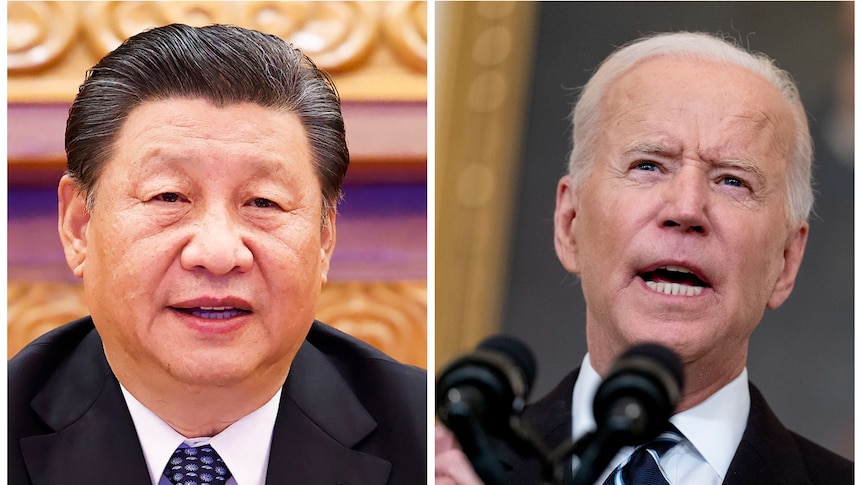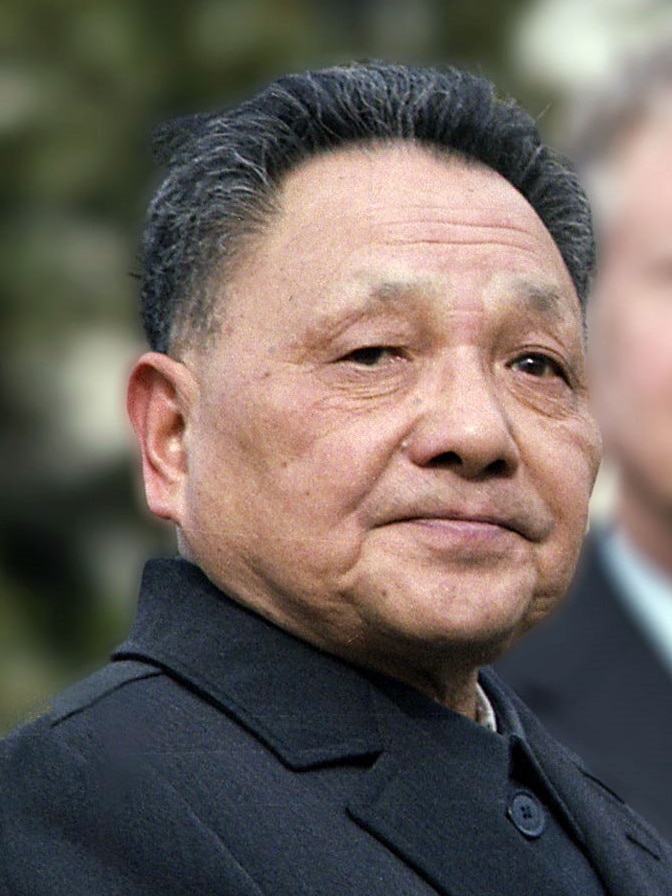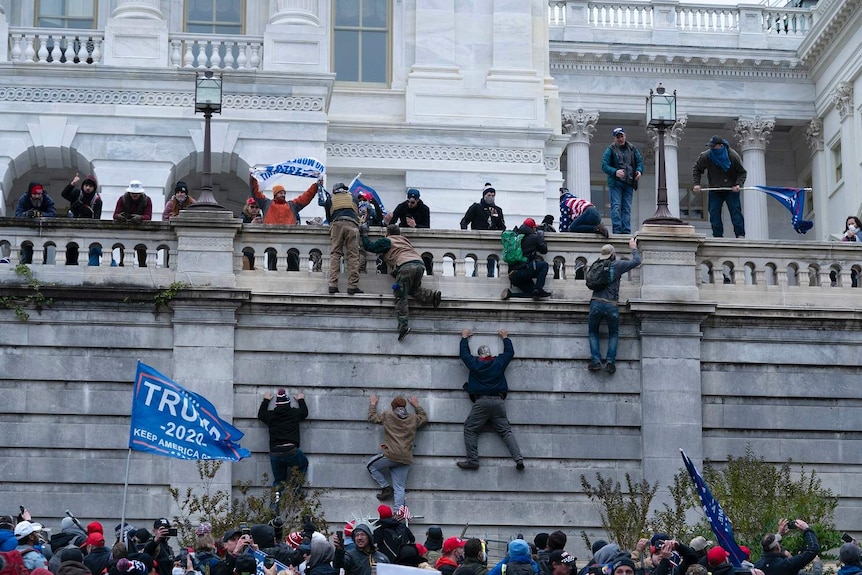By Stan Grant

China has emulated the West
The French philosopher, Rene Girard, founded the idea of mimetic theory. Girard said we encourage others to imitate or emulate us, until they desire what we desire and then imitation becomes rivalry.
Antagonists, he said, become "doubles" of each other.
Our desires cannot be shared. The double becomes a "scapegoat", a sacrifice for our own sins. Conflict masks our own complicity.
Is this what we see with China?
Rather than reject the West, China has in fact emulated it. Rather than overthrow the global order, China has joined it. The order has facilitated China's rise as an economic power.
China has wanted what the United States has.



Rather than reject the West, China has in fact emulated it. China has wanted what the United States has.
Despite the drumbeats of war-style headlines, nothing in the Chinese Ambassador's National Press Club appearance this week was surprising.
Xiao Qian said nothing that has not been said before. He said nothing that is outside Chinese Communist Party orthodoxy.
Taiwan belongs to China. "All necessary measures." "No room for compromise."
We have heard it all before. All from the CCP playbook.
What were we expecting?
The Communist Party has always reserved the use of force to "reunify" Taiwan with the China mainland.
In 1996 the US and China eyed each other over the Taiwan Strait as tensions escalated and war loomed.
Now is no different. China has been no different. The CCP has locked up dissidents, silenced voices and oppressed minority groups from Tibetans to Uighur Muslims yet none of that stopped us from drawing closer to China, deepening economic ties.]
Xi Jinping was feted by our political leaders on a visit to Australia in 2014. The same Xi Jinping then as he is now.
The West just wanted to believe that China would change. That it would become more like us. Well consider this: what if the uncomfortable truth is China is much more like us than we'd like to admit?
Xiao Qian said nothing that has not been said before. He said nothing that is outside Chinese Communist Party orthodoxy.
Taiwan belongs to China. "All necessary measures." "No room for compromise."
We have heard it all before. All from the CCP playbook.
What were we expecting?
The Communist Party has always reserved the use of force to "reunify" Taiwan with the China mainland.
In 1996 the US and China eyed each other over the Taiwan Strait as tensions escalated and war loomed.
Now is no different. China has been no different. The CCP has locked up dissidents, silenced voices and oppressed minority groups from Tibetans to Uighur Muslims yet none of that stopped us from drawing closer to China, deepening economic ties.]
Xi Jinping was feted by our political leaders on a visit to Australia in 2014. The same Xi Jinping then as he is now.
The West just wanted to believe that China would change. That it would become more like us. Well consider this: what if the uncomfortable truth is China is much more like us than we'd like to admit?
China has emulated the West
The French philosopher, Rene Girard, founded the idea of mimetic theory. Girard said we encourage others to imitate or emulate us, until they desire what we desire and then imitation becomes rivalry.
Antagonists, he said, become "doubles" of each other.
Our desires cannot be shared. The double becomes a "scapegoat", a sacrifice for our own sins. Conflict masks our own complicity.
Is this what we see with China?
Rather than reject the West, China has in fact emulated it. Rather than overthrow the global order, China has joined it. The order has facilitated China's rise as an economic power.
China has wanted what the United States has.
Deng Xiaoping was responsible for opening up China's economy to the world.(Wikimedia Commons)
Deng Xiaoping launched China's economic reforms in the 1990s after earlier visiting the United States, touring a Ford car factory, attending a rodeo and donning a cowboy hat.
China embraced aspects of capitalism — albeit with "Chinese characteristics" — even joining the World Trade Organisation.
It is a member of multilateral institutions, has signed international treaties and agreements, and is a permanent member of the United Nations Security Council.
The West wanted China to become more like us. It did so extraordinarily successfully. Hundreds of millions of people were lifted out of poverty. China became the world's factory.
A nation that once could not feed itself is now the world's biggest engine of economic growth and poised to eclipse America as the single biggest economy.
As much as it is seen as a threat, it is also indispensable.
Deng Xiaoping launched China's economic reforms in the 1990s after earlier visiting the United States, touring a Ford car factory, attending a rodeo and donning a cowboy hat.
China embraced aspects of capitalism — albeit with "Chinese characteristics" — even joining the World Trade Organisation.
It is a member of multilateral institutions, has signed international treaties and agreements, and is a permanent member of the United Nations Security Council.
The West wanted China to become more like us. It did so extraordinarily successfully. Hundreds of millions of people were lifted out of poverty. China became the world's factory.
A nation that once could not feed itself is now the world's biggest engine of economic growth and poised to eclipse America as the single biggest economy.
As much as it is seen as a threat, it is also indispensable.
China is now the world's biggest engine of economic growth.
(Xinhua via AP: Chen Yuxuan)
Who can be exceptional?
Now a powerful China claims the prerogative of America: exceptionalism.
China looks at history and says great powers don't play by the rules. Chinese leaders will often point out that it is the West that has colonised and occupied, carried out ethnic cleansing and genocide.
British writer and thinker John Gray says countries like China and Russia are "ruled by ideas that derive from Western sources".
A reality check from the Chinese ambassador
Now a powerful China claims the prerogative of America: exceptionalism.
China looks at history and says great powers don't play by the rules. Chinese leaders will often point out that it is the West that has colonised and occupied, carried out ethnic cleansing and genocide.
British writer and thinker John Gray says countries like China and Russia are "ruled by ideas that derive from Western sources".
A reality check from the Chinese ambassador
In a raw and revealing address, Xiao Qian has made clear just how uncompromising China will be on the core issues, writes David Speers.
What the West confronts, he says, "is not the threatening advance of alien civilisations but its own dark shadows".
Gray rightly points out that generations of Chinese leaders have studied the West. They are steeped in the Western canon and political thought.
The 20th-century German jurist and theorist Carl Schmitt is especially influential. Politics, he said, is a state of warfare. There is a permanent enemy.
Schmitt said states are about harmonising the population. Xi Jinping seeks "harmony" by force, targeting groups like Muslim Uyghurs for "re-education" — what's been called a genocide.
After World War I, new nation states emerged in Europe which suppressed or erased minority populations.
Gray says China today is "the site of an experiment in coercive nation-building whose closest historical parallels are in interwar Europe".
What is happening in China has happened before in the West. The West has not just been about democracy, as Gray reminds us, "but mixtures of fascism, communism and integral nationalism".
The West's redeeming feature has been its liberalism. But that too is under threat.
Liberalism under threat
Post-Cold War democracies have been hijacked by an illiberalism: winding back the institutions of democracy and falling prey to autocratic strongmen.
Societies have become increasingly tribal, the media more partisan and notions of truth are contested.
As Gray says: "Those who believe humankind is converging on liberal values overlook the fact that Western societies are fast discarding them."
Gray is only the latest to identify what others long before have warned about.
Gray rightly points out that generations of Chinese leaders have studied the West. They are steeped in the Western canon and political thought.
The 20th-century German jurist and theorist Carl Schmitt is especially influential. Politics, he said, is a state of warfare. There is a permanent enemy.
Schmitt said states are about harmonising the population. Xi Jinping seeks "harmony" by force, targeting groups like Muslim Uyghurs for "re-education" — what's been called a genocide.
After World War I, new nation states emerged in Europe which suppressed or erased minority populations.
Gray says China today is "the site of an experiment in coercive nation-building whose closest historical parallels are in interwar Europe".
What is happening in China has happened before in the West. The West has not just been about democracy, as Gray reminds us, "but mixtures of fascism, communism and integral nationalism".
The West's redeeming feature has been its liberalism. But that too is under threat.
Liberalism under threat
Post-Cold War democracies have been hijacked by an illiberalism: winding back the institutions of democracy and falling prey to autocratic strongmen.
Societies have become increasingly tribal, the media more partisan and notions of truth are contested.
As Gray says: "Those who believe humankind is converging on liberal values overlook the fact that Western societies are fast discarding them."
Gray is only the latest to identify what others long before have warned about.
Societies have become increasingly tribal, the media more partisan and notions of truth are contested.(AP: Jose Luis Magana)
Judith Shklar, half a century ago, identified that "liberalism had lost its moral core".
Shklar was writing in the wake of enormous upheaval and the nightmares of utopian visions of political order.
Faith in progress appeared as a mirage. As she said: "In the age of two world wars, totalitarian dictatorship, and mass murder this faith can be regarded as simple-minded…"
The Western paradox between freedom and tyranny was built into the Enlightenment.
The French Revolution descended into terror. The world has fought unending wars with its own dark shadows for centuries.
Now there is talk of war again. This time against a foe that imitates Western ideals even as Xi rejects Western hegemony itself.
The time to ask hard questions
In comparing China to the West there is a risk of moral relativism. That's dangerous. In two decades of living in or reporting on and from China, I have seen — and experienced — all too clearly the worst repressive aspects of the CCP.
But this moment does ask us for moral clarity: What is the West? What is the future of liberalism and democracy? What is a global order?
In the West, there is a sense of alienation and gloom. Shklar, quoting Hegel, called this the "unhappy consciousness". The reason and rationality that had powered Western progress had to many come to feel like a "strange and hostile prison".
This, Shklar warned, was the "romanticism of defeat".
The West is wrestling with itself even as it confronts a more powerful, aggressive China.
John Gray, writing about the West's contradictions and drift to illiberal tyranny, says the "arc of history points to a model that no longer exists".
Paradoxically he says, the West isn't dying, the worst of it remains "alive in the tyrannies that now threaten it".
Judith Shklar urged the West to rescue itself from its own gloom and find a new vigorous sense of renewal.
If China represents the worst aspects of the West, does this moment demand that the West look to itself?
The West's battle is also with itself and its own legacy.
In Rene Gerard's terms, China while not a "scapegoat", can be seen as a "twin"; albeit today cast as the "evil twin."
The West is not responsible for Xi Jinping landing missiles off the waters of Taiwan. The Chinese leader — like his friend Vladimir Putin — frighteningly seems to have the taste of apocalypse in his mouth.
But we live in a world the West has made. If liberal democracies are to prevail in this moment and avert a drift to catastrophic war, is now not a time to present China a more virtuous and strong global order that if it will not emulate, it would find impossible to resist?
Stan Grant is the ABC's international affairs analyst and presenter of Q+A on Thursday at 8.30pm. He also presents China Tonight on Monday at 9:35pm on ABC TV, and Tuesday at 8pm on the ABC News Channel.
Judith Shklar, half a century ago, identified that "liberalism had lost its moral core".
Shklar was writing in the wake of enormous upheaval and the nightmares of utopian visions of political order.
Faith in progress appeared as a mirage. As she said: "In the age of two world wars, totalitarian dictatorship, and mass murder this faith can be regarded as simple-minded…"
The Western paradox between freedom and tyranny was built into the Enlightenment.
The French Revolution descended into terror. The world has fought unending wars with its own dark shadows for centuries.
Now there is talk of war again. This time against a foe that imitates Western ideals even as Xi rejects Western hegemony itself.
The time to ask hard questions
In comparing China to the West there is a risk of moral relativism. That's dangerous. In two decades of living in or reporting on and from China, I have seen — and experienced — all too clearly the worst repressive aspects of the CCP.
But this moment does ask us for moral clarity: What is the West? What is the future of liberalism and democracy? What is a global order?
In the West, there is a sense of alienation and gloom. Shklar, quoting Hegel, called this the "unhappy consciousness". The reason and rationality that had powered Western progress had to many come to feel like a "strange and hostile prison".
This, Shklar warned, was the "romanticism of defeat".
The West is wrestling with itself even as it confronts a more powerful, aggressive China.
John Gray, writing about the West's contradictions and drift to illiberal tyranny, says the "arc of history points to a model that no longer exists".
Paradoxically he says, the West isn't dying, the worst of it remains "alive in the tyrannies that now threaten it".
Judith Shklar urged the West to rescue itself from its own gloom and find a new vigorous sense of renewal.
If China represents the worst aspects of the West, does this moment demand that the West look to itself?
The West's battle is also with itself and its own legacy.
In Rene Gerard's terms, China while not a "scapegoat", can be seen as a "twin"; albeit today cast as the "evil twin."
The West is not responsible for Xi Jinping landing missiles off the waters of Taiwan. The Chinese leader — like his friend Vladimir Putin — frighteningly seems to have the taste of apocalypse in his mouth.
But we live in a world the West has made. If liberal democracies are to prevail in this moment and avert a drift to catastrophic war, is now not a time to present China a more virtuous and strong global order that if it will not emulate, it would find impossible to resist?
Stan Grant is the ABC's international affairs analyst and presenter of Q+A on Thursday at 8.30pm. He also presents China Tonight on Monday at 9:35pm on ABC TV, and Tuesday at 8pm on the ABC News Channel.
No comments:
Post a Comment